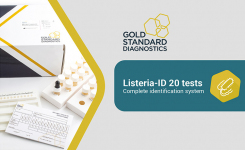For several decades, the pneumococcal polysaccharide enzyme-linked immunosorbent assay (ELISA) has been employed in the serological evaluation of novel pneumococcal conjugate vaccines. However, this assay has often been characterized by a continuous pursuit for enhanced specificity. In an attempt to improve assay precision, a third-generation ELISA was developed that reduced the effects of nonspecific antibody binding. In this assay format, human serum samples are pre-adsorbed with a cell wall polysaccharide (C-PS) and the 22F capsular polysaccharide to neutralize antibodies against common contaminants present in pneumococcal polysaccharide antigen preparations1. To assess the specificity of the third-generation pneumococcal ELISA, several laboratories analyzed pre-adsorbed serum samples with purified, serotype-specific pneumococcal polysaccharides obtained from ATCC2-4. In each study, the removal of non-polysaccharide specific antibodies by 22F adsorption was found to improve assay specificity, particularly at low antibody concentrations. In conclusion, pneumococcal polysaccharide antibody ELISAs that use 22F inhibition can be recommended as a reference method.
References

















